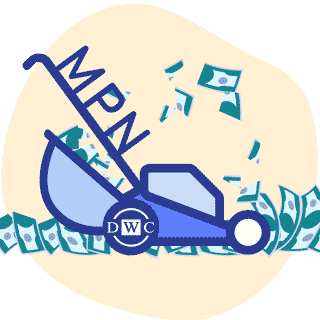CA MPNs Harm Employers, Injured Workers & Providers

California’s Medical Provider Network (MPN) system is an unmitigated failure, causing genuine harm to injured workers, health care providers, and employers.
The Division of Workers' Compensation (DWC) has recently proposed updates to MPN regulations. While MPN reform is urgently needed, none of the DWC’s proposals address the core problems of this broken system.
Most crucially, the proposals do not address how MPNs are used to push doctors into discount reimbursement contracts with Preferred Provider Organizations (PPOs), undermining state fee schedules and making it financially unsustainable to treat injured workers.
The proposals also do not offer a reliable mechanism for doctors to determine which of the 2,505 MPNs apply to an injured worker, if any. Further, physicians have no mechanism to track their own participation status in the thousands of ever-changing MPN provider rosters.
The lack of a properly functioning, publicly available MPN database has led to consistent payment abuse, as claims administrators deny payment based on erroneously (or falsely) alleged provider non-participation in MPNs, including MPNs that are terminated, withdrawn, or non-existent.
The MPN system, as currently utilized, is simply a mechanism by which claims administrators (and where applicable, their private equity owners) restrict injured workers to receiving treatment only from physicians from whom they can siphon revenue.
If enacted, the proposed changes would not stem the MPN-based payment abuse that currently makes treating injured workers monumentally more administratively challenging. Instead, they would merely protect the status quo, allowing MPNs to continue undermining the integrity of the care provided.
Context: CA UR Requirements
California maintains strict medical Utilization Review (UR) requirements mandating that the claims administrator approve all medical treatment provided to an injured worker.
To control medical costs, California requires employers to pay claims administrators to review every physician-recommended treatment (e.g., surgery, pharmaceuticals, diagnostic tests, etc.) to assess whether the treatment is medically necessary.
However, providers participating in an applicable MPN are not exempt from obtaining UR approval for recommended treatment.
Given that claims administrators, through the UR system, exert complete control over the care injured workers receive, all stakeholders should ask what value MPNs actually provide to employers or injured workers.
The Central Issue: PPO Discounts as a Condition of MPN Membership
In practice, MPNs' primary purpose is to cajole providers into discount reimbursement contracts with PPOs, which allow these entities to skim reimbursements. By making MPN membership conditional on PPO membership, providers essentially must pay to treat injured workers.
These PPO contractual reimbursement discounts are leased, sold, and otherwise transferred to other payers, bill review services, and entities that profit by siphoning provider revenue, leading to practice-wide revenue loss.
Consider the case of a doctor who faced egregious treatment at the hands of The Zenith and Anthem Blue Cross PPO. Despite repeated requests, both entities failed to produce a contract that justified reducing the doctor's reimbursement to 45% below fee schedule rates. This reduction was based on a purported PPO agreement that the doctor had no recollection of signing, and which neither Zenith nor Anthem could substantiate.
The doctor formally requested to exit the Anthem PPO network to regain financial stability. This move prompted Zenith to remove the doctor from its MPN, effectively barring the doctor from treating injured workers within its network.
We must question whether Zenith cared in any way about the quality of care provided by this doctor–quality of care being one of the ostensible justifications for the existence of MPNs.
This punitive action eliminated a provider willing to treat injured workers, and sent the unmistakable message that challenging PPO discounts (justified or otherwise) will result in MPN exclusion.
MPN Data (Mis)Management
The DWC has utterly failed to provide a reliable and accessible way for a provider to determine whether an MPN applies to an injured worker, and whether or not the provider is a participating member of the applicable MPN.
Instead, providers are expected to trust the claims administrator to identify the applicable MPN and determine their participation, or lack thereof. As repeatedly demonstrated, this lack of transparency and accountability leaves providers vulnerable to claims administrator payment errors, manipulation, and abuse.
Without a usable MPN database, claims administrators can arbitrarily cite any MPN to justify treatment restrictions and payment reductions or denials, often without evidence that the MPN cited is valid or applicable.
This information vacuum breeds abuse, as seen in various cases where terminated or wholly non-existent MPNs were cited to justify payment denials and adjustments.
Instead of providing a functional solution, the DWC maintains an MPN web page that is, woefully inadequate. The page includes a searchable index of 2,505 MPNs, the vast majority of which are defunct. Some MPNs listed reflect the names of the employers or insurers that maintain those MPNs, while others do not. Individual claims administrators can maintain dozens of MPNs; providers can be added or removed at a whim.
Astonishingly, the DWC requires claims administrators to update MPN physician rosters only quarterly, rendering these rosters consistently outdated, inaccurate, and often less than useless.
The opacity is astounding.
We continue to call on the DWC to create a working, centralized, always-current MPN database where providers can check MPN applicability by simply entering the employer's name or TIN, as well as, check their eligibility to treat by entering their name or NPI. Such a solution is eminently achievable with existing technology.
DWC Complicity
The DWC has also quietly deleted essential MPN-related FAQs from its website.
Previously, these FAQs clarified that Utilization Review Organizations (UROs) could not deny care based on a provider’s non-participation in an MPN. This deleted information is crucial for providers to understand their rights and the meaning of regulations governing their practices.
More importantly, this information is essential for injured workers to receive adequate care. When a provider recommends a given treatment, California law requires the claims administrator to assess that care based on medical necessity—not whether the provider is in an MPN.
Once a claims administrator authorizes medical treatment, California law requires payment for the authorized treatment regardless of whether the physician is an eligible MPN provider. Unfortunately, claims administrators routinely deny payment for authorized services based on claims of MPN non-participation.
Without this now-deleted FAQ knowledge, the DWC has made it even harder for providers to fight improper MPN-based payment denials that contravene state law and regulations.
Why would the DWC make this knowledge less accessible to providers? The only beneficiaries are claims administrators and their private equity owners, who profit from the convoluted MPN system the DWC created and continues to keep shrouded in opacity.
Case Studies and Commentary From Stakeholders
Sedgwick/Orange County No-Telehealth Policy
Sedgwick, a Third-Party Administrator (TPA), informed providers that Orange County refuses to reimburse telehealth services, claiming that all MPN members were notified of this policy.
However, when pressed for proof of notification, Sedgwick could provide none and acknowledged that this policy was not disclosed in treatment authorization documents.
Further investigation revealed even more profound issues with MPN mismanagement. The provider discovered that all three MPNs listed for Orange County were terminated. When confronted, Sedgwick cited a different MPN, WellComp—but could not provide proof. The only active WellComp MPN openly allows telehealth, contradicting Sedgwick’s no-telehealth claims.
Sedgwick's failure to substantiate its claims highlights the systemic issue: providers have no reliable way to determine which, if any, of the 2,505 MPNs listed by the DWC applies to a given injured worker. This lack of transparency allows claims administrators to justify and enforce arbitrary treatment guidelines without accountability.
CA Claims Adjuster: MPNs “Kafkaesque”
The complexity and opacity of the MPN system are not just problematic for providers. A claims adjuster also shared their frustrations with daisyBill, admitting difficulty navigating their MPN listings and being chastised for applying the wrong ones.
The adjuster described the system as "Kafkaesque," illustrating how even those tasked with managing MPNs struggle to understand and implement them effectively. This confusion and lack of clarity contribute to the broader dysfunction, leading to delays and denials of care that ultimately harm injured workers.
Defense Attorney: "MPNs Benefit No One"
A defense attorney representing workers’ comp payers shared his viewpoint on MPNs, emphasizing their uselessness to employers. According to the attorney, MPNs complicate disputes regarding an employee’s ability to return to work.
Without MPNs, Qualified Medical Evaluators (QMEs) have the final word in such disputes. However, under MPNs, injured workers can "shop within the MPN" for a physician who believes the employer owes more workers’ compensation benefits, leading to more complexity and potentially prolonged disputes.
The attorney advised his employer clients to terminate their MPNs, stating that they make no business sense for employers.
Conclusion
The use of MPNs to impose unwarranted PPO payment reductions on providers threatens practices' financial viability and undermines care delivery to injured workers. Minor regulatory tweaks will not be adequate to correct this.
California's legislators and regulators must first uncouple MPN membership from PPO membership and outlaw any requirement that providers accept contractual discounts to participate in an MPN.
Secondly, California must address the DWC's failure to provide a reliable MPN database, ensuring that providers have the necessary tools to verify MPN applicability and protect themselves from arbitrary and unjust financial practices.
Until these broader changes are made, MPNs will continue to be wielded as cudgels by claims administrators and their private equity owners to wring revenue from providers, driving dedicated health care professionals away from treating injured workers.
However difficult, the MPN system must be reformed in significant, meaningful, and substantive ways.
The proposed updates fall far short of addressing the most fundamental problems. Instead, these proposals merely rearrange words like the proverbial deck chairs on the Titanic—and allow the indefensible status quo to persist.
Protect your practice. Harness the power of daisyBill software, data, and expertise for faster, better workers’ comp billing. Reach out to learn how we can help.
CONTACT US
DaisyBill provides content as an insightful service to its readers and clients. It does not offer legal advice and cannot guarantee the accuracy or suitability of its content for a particular purpose.




.gif)

i have been trying to contact careworks ppo who is illegally reducing my payments even though i never sign contract & i am not listed in their providers list. They wiil not answer.
I strongly agree with your comments and suggested changes. The current system is unfair and denies many workers legitimate access to care.
Employers are required to have workers' compensation insurance for injury to their workers. Yet, these claims administrators want providers to sign up to be in the MPN just to cut their reimbursement rate. It makes it difficult for providers to keep afloat with the high cost of inflation and continues to rise. Providers will not want to treat work related injuries if they can not be reimbursed properly. Then we will have injured workers treating in hospitals which will affect patient care. The use of MPNs to impose unwarranted PPO payment reductions on providers threatens practices' financial viability and undermines care delivery to injured workers. Minor regulatory tweaks will not be adequate to correct this. Your proposed plans are not fitting for the hard work of providers. I kindly ask that when you hold this meeting, you discuss a plan and alternative ways to improve it.
This system is so messed up. It won't be long before there isn't any quality providers willing to treat an injured worker. We just took in an injured worker using Sedgwick and they denied the Initial evaluation code completely saying we were not licensed to provide that service!!! Are you kidding me!! That is exactly what we are licensed to do!!!!! So now I have to fight for that payment. We were paid 70.00 on an almost 300.00 claim!! This was done even though a copy of the therapist license including all the other needed documents were submitted with the the claim!!
How can I help? I have mentioned before we terminated all the PPO/mom's we were associated with. They still keep finding one from somewhere else to use. I send out notices certified return receipt only to have it come back undeliverable. I haven't given up. I keep following up. It has started to pay slowly
The DWC has already established payment schedules for treating worker's industrial injuries. The only thing these MPN networks do are force providers to take "discounts" off of the OMFS which then goes directly (at least in part) to the PPO network. Trating workers in the work comp system already adds a significant burdento the providers and their staff. Being forced to join these pay for play networks does nothing to improve the quality of care.
As a physician treating injured WC patients in California the MPN has been the most frustrating part of injured workers care.
Each instance company has many MPN and as a physician you or your staff can never figure it out If one is participating in the particular MPN or not. The claim examiners often send letters with false information about MPN participation which affects and delays patient care. As a provider I often receive denial of treatment on basis of MPN although I am participating MPN provider. The insurance companies often use MPN falsely as excuse to delay or deny care to injured workers.
It is often impossible to find MPN provider since most providers are either not taking WC cases or they want letter of certification with their name on certification from claim examiner prior to giving the injured worker appointment or the list of MPN provider is outdated. It is our experience that many claim examiners do not respond to request in giving certification for months and the certification from UR expires and it takes several months to get new extension. The injured worker mostly are waiting for months or years to get proper care due to MPN nightmare in finding suitable medical provider. Also Kaiser or Concentra and similar big providers only take cases which are handled by their doctors and often some MPN list only have those companies on MPN. As an independent small provider you don’t have access to those company providers (Kaiser or Concentra or similar).
Also most MPN coordinators assign by insurance companies won’t answer the call or given telephone number keeps on ringing with no one responding. The whole thing is a big scam and a mess.
This puts burden on EDD since many patients are not getting paid from WC although claim approved. Many injured workers get financially ruined due to delay in getting treatment and due to delay in returning back to work.
The whole WC system in CA is broken and causing catastrophic losses to injured workers, employers and physicians treating injured workers. The court date takes several months due to backlog of cases. The employer suffers due to injured worker not able to return to work and they get wrongful termination lawsuit if they replace injured worker. This big mess is causing exodus of many companies leaving California.
The only party benefitting with this MPN nightmare system is WC insurance companies since they can delay and deny payments. This burdens EDD and CA Medical since injured workers are forced to use Medical or private insurance in getting their medications or other medical services only if they have coverage. Many injured workers when stop working loose their private insurance through work and also most private insurances won’t treat or cover them due to work injuries which requires to treat by law only under WC system. The injured workers often have to hide their work injuries to get treatment due to significant delays and denial of treatment through WC system due to MPN nightmare. The California tax payer ends up paying for treatment which is supposed to be provided through a WC insurance company.
This broken MPN system needs to be replaced or reformed as a top priority.